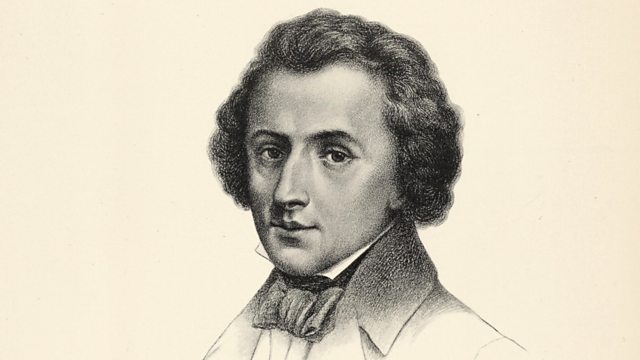
Polish Roots
Donald Macleod explores the life and work of Fryderyk Chopin, often referred to as 'the poet of the piano'. Today, how Chopin’s Polish heritage shaped his music.
Donald Macleod explores the life and work of Fryderyk Chopin, often referred to as “the poet of the piano”. Today, how Chopin’s Polish heritage shaped his music.
Chopin’s precocious musical gifts – not just as a pianist, but as a composer too – were apparent very early on. His first composition appeared in print in 1817, in Warsaw, when he was just seven years old. It’s a ‘polonaise’, the Polish national dance – a stately, triple-time number danced by aristocracy and country folk alike – a form Chopin continued to explore throughout his life. Even more so the mazurka; Chopin didn’t invent the genre, but he became its major exponent, producing almost 60 mazurkas, from his teens right through to his very last composition. The mazurka originated in a Polish folk dance called the mazurek, itself derived from the slow kujawiak and the fast oberek – both of which Chopin experienced ‘in the field’ when he spent two summers in his mid-teens in a village called Szafarnia, in the province of Mazovia, 125 miles northwest of Warsaw. This childhood experience left a deep mark, and it’s in his mazurkas that some of Chopin’s most adventurous and innovative music is to be found. The heroic ballads of the Polish nationalist poet Adam Mickiewicz left a more subtle imprint on Chopin’s consciousness – one that subsequently emerged in his wonderful sequence of Ballades, which, while they aren’t programmatically related to individual poems of Mickiewicz, draw their powerful narrative drive from his work as a whole. All of which suggests that though you may take the Pole out of Poland – Chopin left the country when he was 20, never to return – you can’t take Poland out of the Pole.
‘Życzenie’ (The maiden’s wish), Op 74 No 1
Eugenia Zareska, mezzo soprano
Giorgio Favaretto, piano
Piano Concerto No 2 in F minor, Op 21 (3rd mvt, Allegro vivace)
Murray Perahia, piano
Israel Philharmonic Orchestra
Zubin Mehta, conductor
4 Mazurkas, Op 17
(No 1 in B flat; No 2 in E minor; No 3 in A flat; No 4 in A minor)
Polonaise No 5 in C minor, Op 40 No 2
Polonaise No 6 in A flat, Op 53 (‘Heroic’)
Emil Gilels, piano
Ballade No 4 in F minor, Op 52
Krystian Zimerman, piano
Produced by Chris Barstow for BBC Wales
Last on
More episodes
Previous
You are at the first episode
Music Played
-
![]()
Frédéric Chopin
Życzenie (The maiden's wish), Op 74 No 1
Performer: Giorgio Favaretto. Singer: Eugenia Zareska.- WARNER 9671172.
- WARNER 9671172.
- 2.
-
![]()
Frédéric Chopin
Piano Concerto No 2 in F minor, Op 21 (3rd mvt, Allegro vivace)
Performer: Murray Perahia. Orchestra: Israel Philharmonic Orchestra. Conductor: Zubin Mehta.- SONY 88843062432.
- SONY 88843062432.
- 6.
-
![]()
Frédéric Chopin
4 Mazurkas, Op 17
Performer: Arthur Rubinstein.- RCA: GD60822.
- RCA.
- 10.
-
![]()
Frédéric Chopin
Polonaise No 5 in C minor, Op 40 No 2
Performer: Emil Grigoryevich Gilels.- DG 477 9079.
- DG 477 9079.
- 6.
-
![]()
Frédéric Chopin
Polonaise No 6 in A flat, Op 53 ('Heroic')
Performer: Emil Grigoryevich Gilels.- DG 477 9079.
- DG 477 9079.
- 7.
-
![]()
Frédéric Chopin
Ballade No 4 in F minor, Op 52
Performer: Krystian Zimerman.- DG: 477 9198.
- DG.
- 4.
Broadcast
- Mon 24 Jun 2019 12:00BBC Radio 3








